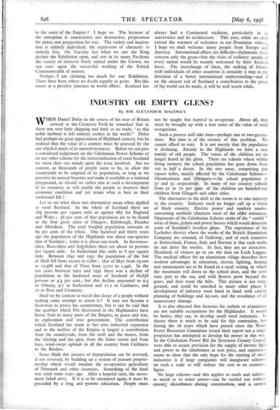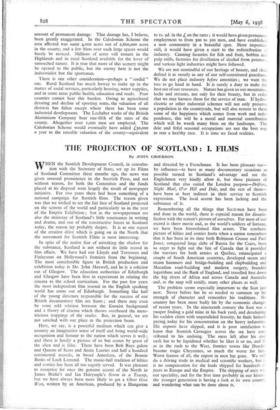INDUSTRY OR EMPTY GLENS?
By SIR ALEXANDER MACEWEN
WHEN at the Cromarty Fir he remarked that as HEN Daniel Defoe in the course of his tour of Britain Firth there was very little shipping and little or no trade, "so this noble harbour is left entirely useless in the world." Defoe had perhaps'no great appreciation of Highland scenery, but he realised that‘the value of a country must be assessed by the use which made of its natural resources. Before we can pass a considered 'judgement on the Caledonian Power Scheme or on any other scheme for the industrialisation of rural' Scotland we must clear our minds upon the issue involved. Are we content, as thousands of people seem to be, to allow the countryside to be emptied of its population, so long as we preserve its natural beauties and make' it available as a national playground, or should we rather aim at such a development of its resources as will enable the people to improve their economic condition and yet retain what is best in their traditional life ?.
Let us see what these two alternatives mean when applied to rural Scotland. In the whole of Scotland there are 163 persons per square mile as against 683 for England and Wales ; 38 per cent; of that population are to be found in the four great cities of Glasgow, Edinburgh, Dundee and Aberdeen. The total burghal population amounts to 69 per cent. of the whole. One hundred and thirty years ago the population of the Highlands was about one-quarter that of Scotland ; today it is about one-tenth. In Inverness-. shire, Ross-shire and Argyllshire there are about 20 persons per square mile. In Sutherland this sinks to 8 per square mile. Between 1841 and 1931 the population of the Isle of Mull fell from to,000 to 2,860; that of Skye from 23,000 to 10,388 and that of Tiree from 5,c0o to 1,446. In the ten years between 1921 and 1931 there was a decline of population in• the landward areas of Scotland of 66,838 persons or 4.3 per cent., but this decline amounted to 9.5 in Orkney, 9.7 in Sutherland and 11.5 in Caithness, and 12 in Ross and Cromarty.
Shall we be content to watch this decay of a people without making some - attempt to' arrest it ? It may not become -a Scotsman to praise his countrymen, but it can be said that the qualities which Pitt discovered in the Highlanders have borne fruit in many parts of the Empire, in peace and war, in exploration and wise government. The contribution which Scotland has made to her own industrial expansion and to the welfare of the Empire is largely a contribution from the countryside, from the croft and the manse, from the shieling and the glen, from the fisher towns and from bare, wind-swept uplands in all the country from Caithness to the Borders.
- Some think this process of depopulation can be arrested, if not reversed, by building up a system of peasant proprie- torship which would emulate the co-operative agriculture of Denmark and other countries. Something of the kind was tried some years ago. After a hopeful start, the move- ment faded away. If it is to be attempted again, it must be not be taught but inspired to co-operate. Above all, they must be brought up with a true sense of the value of rural occupations.
Such a process will take time—perhaps. one or two'genera- lions. -But time is of the essence of "this. problem. We cannot afford to wait.. It is not merely' that the population is declining. Already in the Highlands we have a race mainly of old people. The voices of the children are no longer heard in the glens. There are schools where within living memory -the school. population has gone down from Icto to half a dozen. In the two areas, comprising 300 square miles, mainly affected-by the Caledonian Scheme- Gle.nmoriston and Glengarry—the school population is 37 and 31 respectively. In many -of our country schools from 50 to 7o per cent. of he children are boarded-out children from Glasgow and- other cities.
The alternative to the drift to the towns is to take industry to the country. Industry need no longer call up a vision of black country." Electric power and modern smoke- consuming methods eliminate most of the olCier nuisances. Opponents of the Caledonian Scheme spoke of the " sordid " array of dams, pylons and power houses which would desecrate some of Scotland's loveliest glens. The experience of the Lochaber district where the works of the British Aluminium Company are situated, of Galloway, and of such countries as Switzerland, France, Italy and Norway is that such works do not deter the tourist. In fact, they are an attraction.
Hundreds of visitors go -to see the dam on Loch Laggan.
The medical officer for an aluminium village describes how modern advantages in education, electric lighting, heating and amusements are to be found- in a rural setting in which the mountains roll down to the school door, and the river runs past to the sea, and wild flowers grow beyond the gates, and deer roam the hills. This picture is not exag- gerated, and could be matched in many other places if development of industry went hand in hand with careful planning of buildings and lay-out, and the avoidance cf all unnecessary damage.
It is also objected that factories for carbide or aluminium are not suitable occupations for the Highlander. It would be better, they say, to develop small rural industries. In theory there is much to he- said for this- contention, but during the 18 years which have passed- since the Water Power Resources Committee issued their report not a single proprietor has attempted to develop his power in this way. In the-Caledonian Power' Bill the Inverness County Council were able to secure provision for the supply. of electric light and power to the inhabitants at cost price, and experience seems to show that the only hope for the starting of small industries is if large 'companies will inaugurate schemes on such a scale as will reduce the cost to an economic figure.
No large scheme—and -this applies to roads and railways as much as to water power—can be carried out without amount of permanent damage. That damage has, I believe, been greatly exaggerated. In the Caledonian Scheme the area affected was some 4,000 acres out of 2,600,000 acres in the county, and a few blots over such large spaces would barely be noticed. Millions of acres will remain in the Highlands and in rural Scotland available for the lover of untouched nature. It is true that more of this scenery might be opened to the public, but the enemy here is not the industrialist but the sportsman.
There is one other consideration—perhaps a " sordid " one. Rural Scotland has much leeway to make up in the matter of social services, particularly housing, water supplies, and in some areas public health, education and roads. Poor counties cannot bear this burden. Owing to agricultural derating and decline of sporting rents, the valuation of all districts has fallen except where there has been some industrial development. The Lochaber works of the British Aluminium Company bear one-fifth of the rates of the county. Altogether over i,000 men are employed. The Caledonian Scheme would eventually have added £30,000 a year to the rateable valuation of the county—equivalent to is. 9d. in the on the rates ; it would have given permanent employment to from 300 to 500 men, and have established a new community in a beautiful spot. More important still, it would have given a start to the redistribution of industry. Canning factories for fish and fruit, bobbin and pulp mills, factories for distillation of alcohol from potatoes, and various light industries might have followed.
We are not unmindful of our heritage of beauty, and shall defend it as stoutly as any of our self-constituted guardians. We do not place industry before amenities; we want the two to go hand in hand. It is surely a duty to make the best use of our resources. Nature has given us our mountains, lochs and streams, not only for their beauty, but in order that we may harness them for the service of man. If hydro-. electric or other industrial schemes will not only preserve a population in the countryside, but will also restore to them some of the happiness which comes from work and inde- pendence, this will be a moral and material contribution which will be worth many blots on the landscape. The dole and fitful seasonal occupations are not the best way to rear a healthy race. It is time we faced realities.



































































 Previous page
Previous page